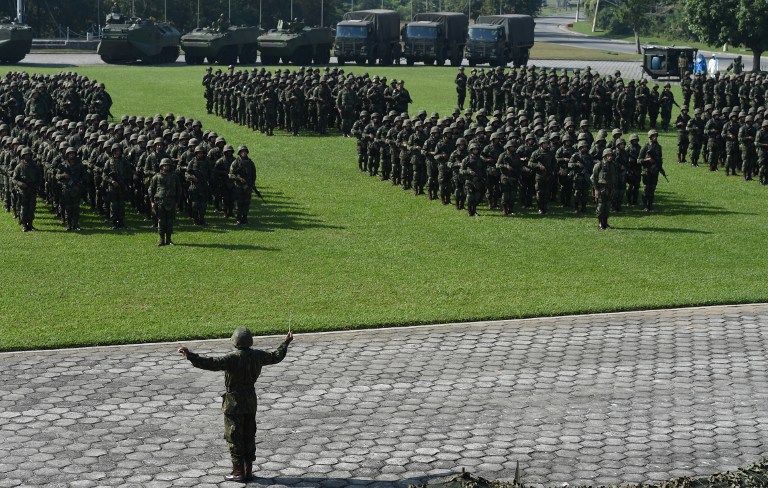
Brazilian Navy members exercise security measures as part of defense maneuvers against a possible terrorist attack along Rio de Janeiro coast, in view of the Rio 2016 Olympic and Paralympic Games, on June 30, 2016 in Rio de Janeiro. AFP
Brazil’s armed forces on Saturday rolled out armored vehicles and heavy weapons to patrol key tourist areas like Copacabana beach ahead of Rio de Janeiro’s hosting of the Olympics in under a month.
That could come as reassuring to some: just last week, members of a huge police force sent to secure crime-ridden Rio before the games came under gunfire.
The shooting incident in the troubled north of Rio de Janeiro underlined the challenge to ensuring safety for the 10,500 athletes and 500,000 tourists expected at the August 5-21 Olympics, the first ever to be held in South America.
Brazil is deploying some 85,000 police and soldiers, double the number used for the London 2012 Olympics, with the vast majority in Rio and others in cities where the football matches are set to take place.
On Saturday, some 1,500-2,000 military staff fanned out across the city to other sites such as the refurbished Plaza Maua, which has become a place to see and be seen in the shadow of its landmark Museum of Tomorrow designed by Santiago Calatrava.
At the famous Maracana football stadium, where opening and closing ceremonies are to be held, an anti-aircraft unit was watched over by a soldier with a bazooka.
A Navy frigate cruised off Copacabana, arguably Rio’s busiest tourist area, while armored tanks rumbled around strategic points of highways.
A total of around 65,000 security personnel will be deployed in Rio, with another approximately 20,000 in the five football competition cities. The military component is 40,000 strong, with some 22,000 in Rio.
While police watch streets, soldiers will be mostly responsible for patrolling the strategic transport corridors linking the four main Olympic hubs around Rio.
The soldiers will be backed by 70 armored cars and 28 helicopters, with the full force in place by July 24, when the Olympic Village opens in the western Barra neighborhood.
Lack of boots on the ground isn’t the only reason Rio’s crime rate has been growing this year. Police, who have seen more than 50 of their ranks killed, are angry after months of not being paid overtime and receiving salaries late in May and June.